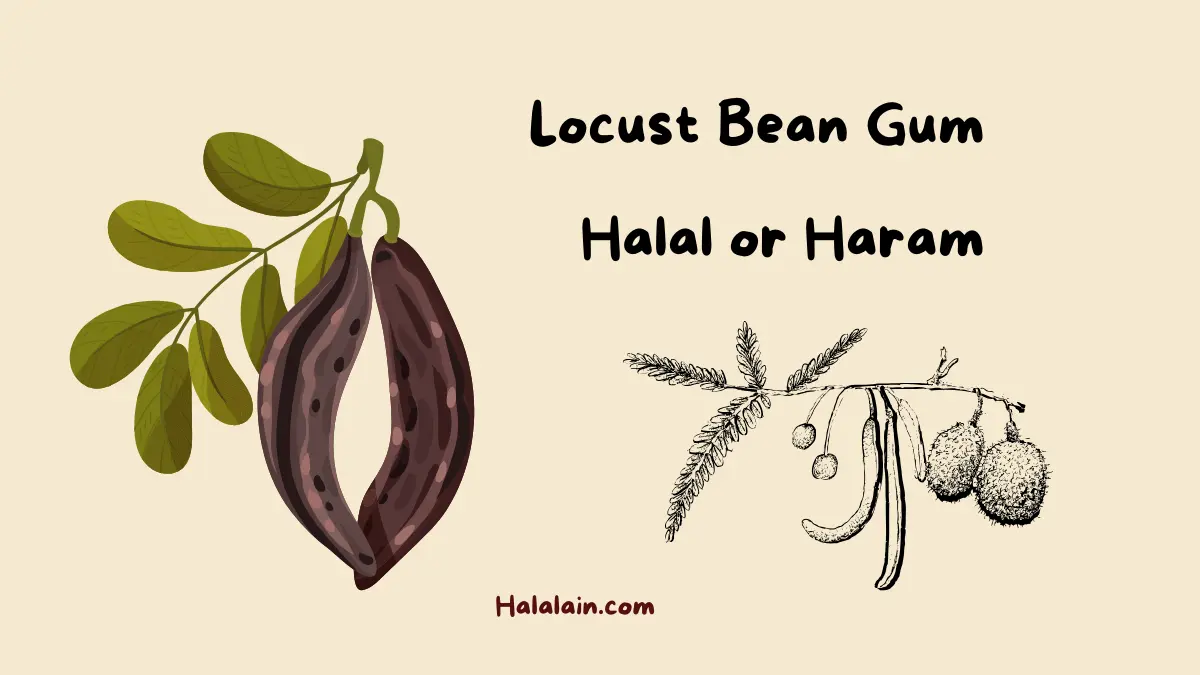Locust bean gum, also known as carob gum, is a natural food. It is extracted from the seeds of the carob tree. Locust bean gum is used in the food and cosmetic industries. It has thickening, stabilizing, and emulsifying properties. This product is quite popular, so the Muslim public raises the question of whether Locust bean gum is halal. In this blog post, we will answer some frequently asked questions about the halal status of locust bean gum, its uses, production process, and a clear understanding.
What is Locust Bean Gum?
Locust bean gum is a polysaccharide. It is obtained from the seeds of the carob tree (Ceratonia siliqua). It is used to thicken and stabilize food products. Locust bean gum is labeled as E410 in the food industry. It plays a valuable role in products such as ice cream, sauces, and baked goods for its ability to improve texture and consistency.
How is locust bean gum made?
The locust bean gum production process involves several steps:
- Harvesting: Carob pods are harvested from the carob tree.
- Seed extraction: The seeds are separated from the pods.
- Cleaning and dehulling: The seeds are cleaned and their outer hulls are removed.
- Grinding: The remaining seed endosperm is roasted into a fine powder, resulting in locust bean gum.
This process is mechanical and does not involve the use of alcohol or haram substances, making the ingredient inherently halal.
Short answer
Yes, locust bean gum is halal. This is because it is derived from a plant source. Its production process does not involve haram ingredients or methods. Therefore, it meets the criteria of the Halal Food Law. However, the Halal status depends on whether the production process and equipment are shared with Haram substances.
Read more:
Uses of Locust Bean Gum in Food
Locust bean gum is a versatile ingredient. This product is found in many food products:
- Dairy products: Used in ice cream, yogurt, and cheese to improve texture and prevent crystallization.
- Baked goods: Increases moisture retention and shelf life.
- Sauces and dressings: Acts as a thickening agent to achieve the desired consistency.
- Processed foods: Used in meat products and desserts for stability.
Locust bean gum in non-food products
In addition to food, locust bean gum is also used in:
- Cosmetics: As a stabilizer in lotions and creams.
- Pharmaceuticals: In tablet formulations.
- Textiles: For sizing fabrics.
Halal Certification and Locust Bean Gum
For Muslims, halal certification ensures that a product complies with Islamic dietary laws. While locust bean gum itself is halal, the products it contains should have the proper halal certification to ensure that there is no cross-contamination or use of haram ingredients during production.
Common Concerns About Locust Bean Gum
Use of Alcohol in Extraction: The locust bean gum production process does not typically involve alcohol, which eliminates halal concerns.
- Contamination: The equipment used to maintain halal status should be free from contact with haram substances.
- Food Product Mixture: Make sure that the other ingredients in the locust bean gum product are also halal.
Health Benefits of Locust Bean Gum
Locust bean gum offers several health benefits:
- Low in calories: Helps with weight management.
- Rich in fiber: Supports digestive health.
- Gluten-free: Suitable for those with gluten intolerance.
- Stabilizes blood sugar: May help regulate glucose levels.
Halal-friendly alternatives to locust bean gum
For those looking for alternatives, the following options are also considered halal:
- Guar gum: Derived from guar beans and used as a thickening agent.
- Xanthan gum: Produced by fermentation and widely used in food products.
- Agar-agar: Derived from seaweed and used as a substitute for gelatin.
Tips for verifying halal products
- Look for the halal certification logo on the packaging.
- Check the source and production process of the ingredient.
- Consult a trusted halal certification body for clarification.
FAQs
Is locust bean gum vegan?
Yes, locust bean gum is plant-based and suitable for vegans.
Can locust bean gum cause allergies?
Allergies to locust bean gum are rare but possible in individuals allergic to legumes.
Is locust bean gum the same as guar gum?
No, they are different ingredients. Locust bean gum is derived from carob seeds, while guar gum comes from guar beans.
Does locust bean gum have a taste?
It has a neutral taste and does not alter the flavor of food products.
Is locust bean gum gluten-free?
Yes, it is naturally gluten-free and safe for those with gluten intolerance.
What is the E number of locust bean gum?
Locust bean gum is labeled as E410.
Does locust bean gum contain alcohol?
No, its production does not involve alcohol.
Can locust bean gum be used in halal cosmetics?
Yes, as long as other ingredients in the product are also halal.
Is locust bean gum safe for children?
Yes, it is generally recognized as safe (GRAS) for consumption by all age groups.
Are there any side effects of consuming locust bean gum?
Overconsumption may lead to digestive issues such as bloating or gas, but it is safe in normal amounts.

